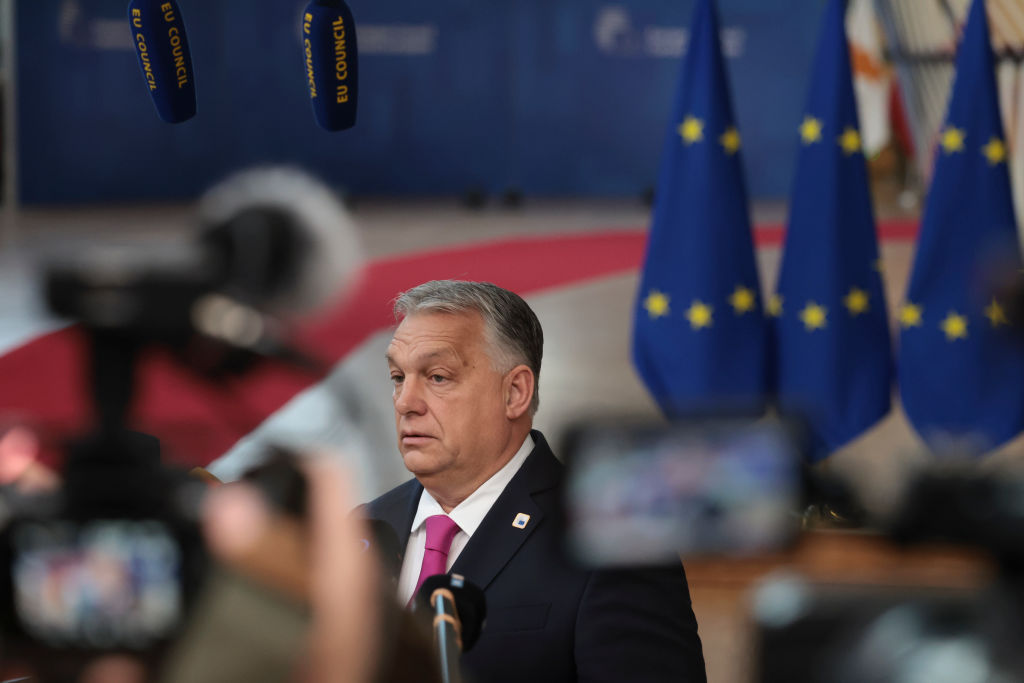
Last week, in a major political victory for embattled Ukrainian President Volodymyr Zelensky, the European Council decided to open accession talks with his country. According to European Commission President Ursula von der Leyen, it was ‘a day that will remain engraved in the history of our Union’. In fact, the real winner was Hungary’s anti-EU prime minister, Viktor Orban.
After threatening for weeks to block the decision, Orban apparently relented by simply leaving the room so that the other leaders could come to an officially unanimous agreement. Not only will he still have plenty of opportunities to sabotage Ukrainian accession in the future, but he also managed to extort EU funds that the European Commission had been withholding over concerns about corruption.
Ironically, that outcome further reinforces arguments against European enlargement. After all, as the Hungarian government has demonstrated for all the world to see, once you are inside the European club, it seems nobody can force you to abide by the club’s rules. The closer Ukraine gets to joining, the louder will be the chorus reminding us that—contrary to all the treaties and moralistic rhetoric from European elites—there are no real limits on corruption and autocratisation within the bloc.
Everyone in the European Union understands that Orban was playing hardball to unlock EU funds. He continuously spun out new reasons for not opening accession talks, citing everything from concerns about Ukraine’s ethnic Hungarian minority to worries about corruption (which was especially rich coming from the leader of a kleptocratic autocracy).
Ultimately faced with the need to make what she called a ‘strategic decision’, von der Leyen accepted cosmetic changes to the Hungarian judicial system. And yet the day before the Hungarian government was cleared, it introduced a draconian law enabling it to hound non-government organisation in the name of ‘defending national sovereignty’.
Not only did Orban’s extortion work, but what was praised as a crafty workaround will end up being extraordinarily costly for Europe as a whole. For that, Europeans can thank German Chancellor Olaf Scholz, who came up with the idea of sending his Hungarian counterpart out for a coffee while the remaining 26 member-state governments voted.
Moreover, although starting accession talks is of major symbolic importance, it won’t help Ukrainians get through the winter. Ukraine is still fighting for its survival against a Russian war criminal who has reaffirmed his aim of wiping it off the map. Orban well knows that the €50 billion promised to Ukraine by the EU is especially critical now that congressional Republicans are throwing America’s own commitments to supplying weapons and aid into doubt. Yet he made sure to have his coffee in the room when the chance presented itself to deny this life-saving support.
European leaders still haven’t found a strategy for dealing with the presence of a veto-wielding Putin ally in their midst. The complacent expectation that a relatively small country can always be incentivised to offer what political scientists call ‘loser’s consent’ may have been reasonable when the EU worked properly as a consensus-building machine on material issues. But those days are gone.
One approach might be for Europe to make Orban’s coffee breaks permanent. There’s already a precedent for working around vetoes to reach agreements on issues such as the pooling of resources. In the early 2010s, British Prime Minister David Cameron learned the hard way that British opposition to EU responses to the euro crisis could indeed be circumvented.
The European Commission clearly is failing to live up to its role as ‘guardian of the treaties’. As critics have been pointing out for years, all the talk of new ‘instruments’ and ‘mechanisms’ (note the technocratic vocabulary) obscures the real problem. What the EU lacks is not legal tools but a willingness to confront member-state governments that are bent on undermining the foundation of European integration: the rule of law.
To be sure, pretending that a problem is technical, rather than political, is sometimes a smart way to help conflicting parties save face. But Orban doesn’t want to save face. On the contrary, he is positioning himself as primus inter pares among a new cohort of European far-right populists. Unlike previous hardline Euroskeptics, the goal is not to leave the EU but to exploit it to the hilt. As Orban put it in a speech last month, the idea is to treat the European Commission president as ‘our employee’ and to extract maximum national advantage. That sums up the right-wing populist platform for next year’s European Parliament elections.
There might have been a time when the EU was strong enough to deal with a government that is gaining the benefits of membership without observing the rules. In the current context, some have found hope in the recent triumph of Poland’s liberal opposition parties over the previous populist government. Might the people themselves solve the problem, by getting rid of anti-European far-right populists at the ballot box?
Unfortunately, such optimism overlooks the fact that Orban’s autocracy is now deeply entrenched, and that a continuous rot within institutions can’t be easily contained. Europe might still grow larger, but it will become ever more fragmented and incapable of resolute joint action. There will be a sprawling periphery where everyone knows that things aren’t really working as they should—and that nobody has the political will to fix them.

